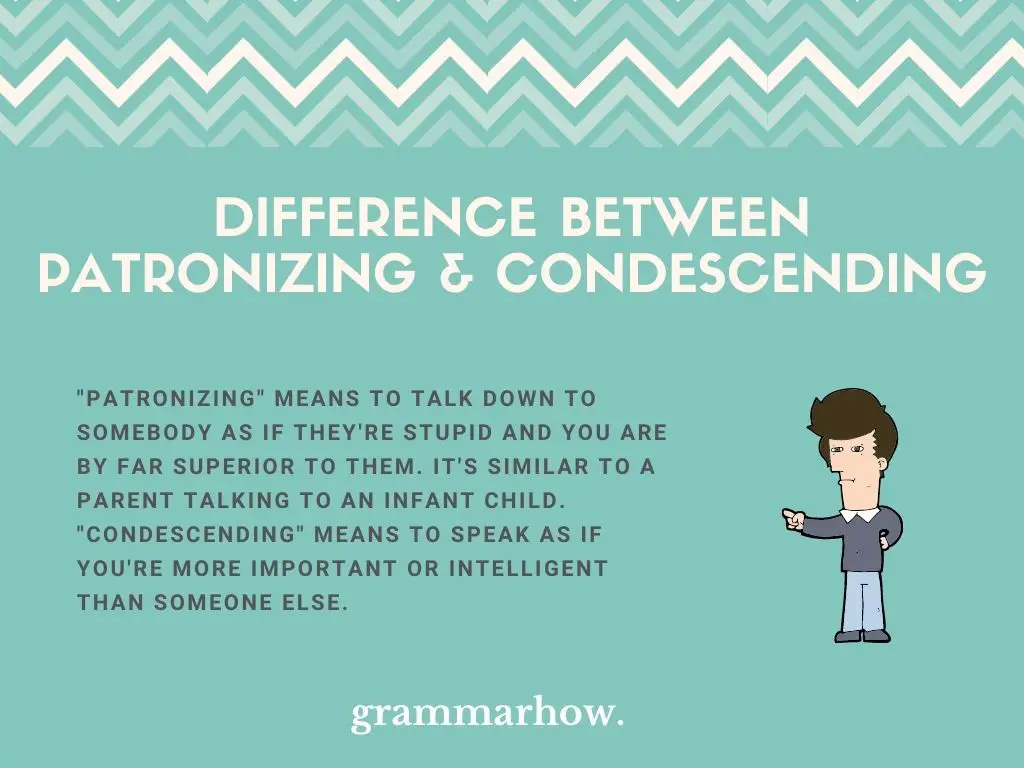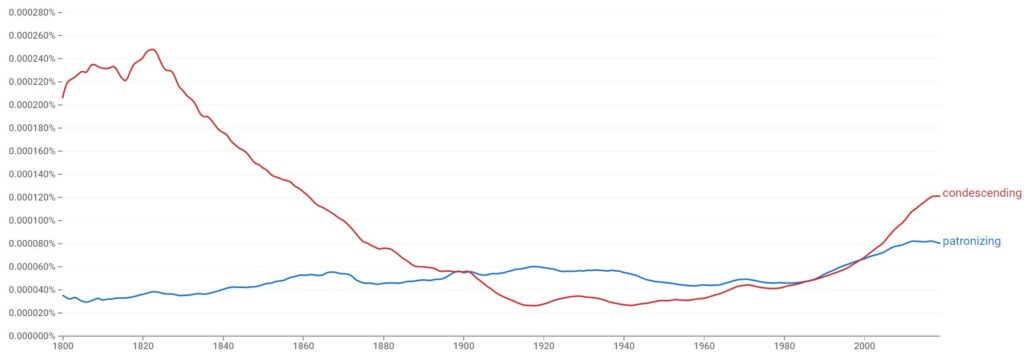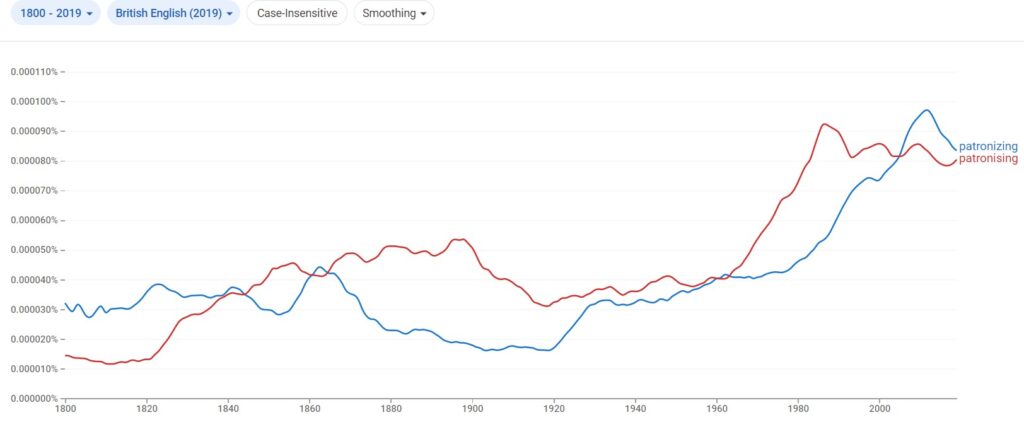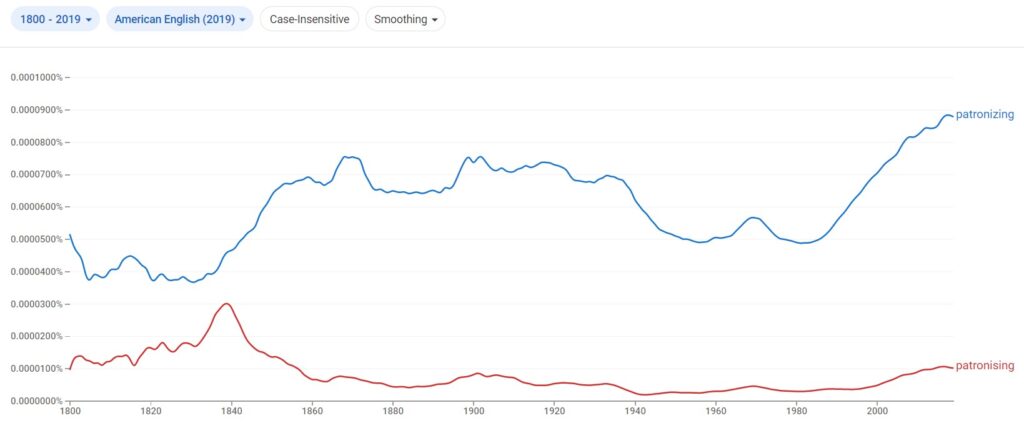The words “patronizing” and “condescending” are almost synonymous. You could use either of them in a sentence, and no one would assume you accidentally meant the other word. This article will explain the very slight differences between them and how to use them.
What Is The Difference Between Patronizing And Condescending?
“Patronizing” means to talk down to somebody as if they’re stupid and you are by far superior to them. It’s similar to a parent talking to an infant child. “Condescending” means to speak as if you’re more important or intelligent than someone else.

The two meanings are almost identical, and we come across something known as a circular definition when we analyze them in more detail.
You can’t define “patronizing” without saying that someone is “condescending,” but you also can’t define “condescending” without saying that someone is “patronizing.”
The easiest way to tell them apart is as follows:
- Patronizing: Talking down to someone because we think they’re stupid.
- Condescending: Talking down to someone because we believe we are smarter.
To “condescend” someone doesn’t always have to mean you think they’re stupid; it just means you believe you are smarter in the given situation than they are.
What Does Patronizing Mean?
The definition of “patronizing,” according to The Cambridge Dictionary, is “speaking or behaving towards someone as if they are stupid or not important.”
“Patronizing” means that we’re talking or behaving poorly towards somebody because we think they are stupid compared to us.
It’s often the harsher term of the two, but most native speakers won’t be able to work out an immediate difference. It’s common to use “patronizing,” similarly to how parents talk to their young children.
While parents don’t often do it in a malicious manner, imagine if they used that same baby-talking voice towards you when they’re trying to explain something. That’s the idea behind how “patronizing” behavior might look.
What Does Condescending Mean?
The definition of “condescending,” according to The Cambridge Dictionary, is “treating someone as if you are more important or more intelligent than them.”
“Condescending” means that we’re treating someone poorly because we believe ourselves to be more intelligent than they are.
Unlike “patronizing,” we’re not always insulting their intelligence. We’re not outright calling them stupid when we “condescend” someone. Instead, we simply believe that we have more information or knowledge on a subject, and we’re teaching them about it in a really rude way.
“Condescending” is the more general of the two words. While “patronizing” is described as similar to how parents act with their infants, “condescending” doesn’t get the same luxury.
Whether you “patronize” someone or “condescend” someone, it’s still a very rude thing to do. You should be careful when it comes to doing either of them, especially if you’re not familiar with the person you’re talking to.
Can Patronizing And Condescending Be Used Interchangeably?
We’ve already mentioned how similar the two meanings are. They come with a circular definition, meaning we use both words to describe the other word.
We can use “patronizing” and “condescending” interchangeably in English. Most native speakers will not notice a difference between either of them. They both mean similar things, and we use them to insult somebody’s intelligence compared to our own.
If we “patronize” someone, we’re treating them poorly because we believe we’re smarter than them. If we “condescend” someone, we’re treating them poorly because we believe we’re smarter than them. That’s the easiest way to define how interchangeable they can be.
Generally, the use of either of them comes down to which one you prefer. Some people are more familiar with “condescending,” while others like the idea of “patronizing” as a written word.
Is Patronizing Or Condescending Used The Most?
To help you understand which of the two is most popular, we’ve got some statistics to refer to. With this knowledge, we can learn what most native speakers use, thus helping us decide which of the two words is more appropriate.
According to this graph, “condescending” is the most popular word. It’s historically been more popular, though had a slight dip in the 1900s below “patronizing.” It’s now on the rise again and is growing much faster than “patronizing.”

“Condescending” seems to be the more popular word of the two for native speakers. After all, the above graph highlights the usage of the two words in English literature over the last 200 years. That’s usually a good indicator of what words are more popular than others.
Examples Of How To Use “Patronizing” In A Sentence
We think it’s time to introduce you to some examples using both words. We’ll start with “patronizing,” and we’ll try and stick to the original meaning that we shared in the article.
“Patronizing” means we’re treating somebody as stupid. It’s used to talk about a field or subject that we believe someone does not know anything about. Often, it’s assumed that somebody is an idiot when we “patronize” them.
- You’re patronizing me, and I can’t stand it! I’m smart!
- I’m sorry if you think I’m patronizing; you don’t seem to know anything about what I’m saying!
- The teachers at my school always patronize us. They think they’re so clever.
- We like to patronize the younger students because they think they’re hot stuff!
- You’re patronizing me, and I’d appreciate it if you would stop.
- Would you please stop patronizing me?
- I know I’m patronizing you right now, but I can’t help it if you’re stupid!
- You’re always being so patronizing!
We use “patronizing” to put somebody else to shame. It’s always done as an insult to their intelligence, and we do it when we want to have a certain level of power above the person we’re talking to.
Incidentally, it’s possible to replace “patronizing” with “condescending” in all of these examples. While the meaning might not be as spot-on, it’s still worth trying to see if you can work out the minor differences they have.
Examples Of How To Use “Condescending” In A Sentence
“Condescending” means we’re treating somebody as inferior to us. We often regard ourselves as the smarter of the two parties when we “condescend” someone. It isn’t an outright attack against their intelligence like “patronizing” is, though.
- You’re constantly condescending towards me, but I know just as much as you do!
- I’m not trying to condescend to you, but I’ve done way more research than you’ll ever know!
- You’re always so condescending!
- We’re not supposed to be condescending to each other, but it’s hard to do when he acts like such a buffoon all the time!
- The boss is always such a condescending man towards us. We wouldn’t have this job if we weren’t smart.
- You like to condescend to the people around you, which is really annoying for everyone involved.
- We make sure to condescend to the readers of our blog just to make sure they understand everything we write.
- You’re not as condescending to me as you seem to think you are. You don’t have to apologize.
“Condescending” is the more general term we use. It refers to someone treating us as the less intelligent of the pairing. However, they might still respect us or admit that we are smart; they just believe that they’re smarter than us at that current time.
Again, we can place “patronizing” into any of these examples instead of “condescending,” and the meaning will be almost identical. That’s how similar the two words are.
Is It Patronizing Or Patronising?
The spelling of “patronizing” is an interesting one. You might have come across other words in the past that differ from British to American English, and it seems that “patronizing” is one of them.
According to this graph, British English uses both spelling variations almost identically. However, in British English, the “Z” letter is always replaced with an “S,” so “patronising” is the more grammatically correct spelling for them.

According to this graph, American English only seems to use “patronizing.” The word “patronising” is rarely used, and that’s because American English values the “Z” in the word to stay true to its pronunciation.

“Patronizing” is correct in American English. “Patronising” is correct in British English.
What Is The Difference Between Belittling And Condescending?
“Belittling” means we’re dismissing the importance of a person or making them feel small. While “condescending” attacks their intelligence compared with us, “belittling” is a more personal attack we can use to be cruel about any number of things on a person.
- He belittled me and my looks.
- You belittled my speech impediment.
- She belittled my family one too many times.
We don’t just have to refer to intelligence when using “belittling.” If we’re insulting somebody by dismissing the importance of something important to them, then we can use “belittling” correctly instead of “condescending.”
What Is The Difference Between Pretentious And Condescending?
“Pretentious” means that we’re attempting to impress someone by using more merit than we need to for a given situation. It’s most commonly noticed when using large words that often aren’t required for the context we write in.
Pretentious people are often annoying to be around. They’ll try to attribute greater merits to themselves to inflate their sense of importance amongst other people.
It’s different from being condescending because it requires a person to act as if they’re more important than someone by doing important things. Rather than making the other person feel small, they’ll try and make themselves seem big.
What Is The Opposite Of Being Condescending?
The opposite of being condescending is being “respectful.” If we’re respectful of somebody, it means we’re treating them with the utmost respect and not doing anything that might cause them upset or harm.
A respectful person often has an easier time talking to everyone and making more friends. It’s human nature to want to be respected, so a respectful person makes use of that.
How Do You Tell If Someone Is Patronizing You?
You can tell if someone is patronizing you by the things they’re saying. If they’ve mentioned anything that’s made you feel stupid or if they’re talking to you in a silly voice that’s supposed to be for babies, they are more than likely patronizing you.
You shouldn’t confront them head-on to deal with this, as it could lead to further conflict. Instead, it’s best to have a calm discussion about how you don’t like the way they’re talking to you.
Is Calling Someone “Dear” Patronizing?
Calling someone “dear” is patronizing if you don’t know them. It’s not a kind word to use if you’re unfamiliar with the person, and you should avoid it. However, if you do know the person, sometimes, “dear” is acceptable.
To demonstrate this, we can refer to the following example:
- Hello dear! I’m so happy to see you.
Something like this might be said by one of your grandparents. In this case, they’re not patronizing you; they’re simply using “dear” as a term of endearment to make you feel happy and loved.
- What can I do for you, dear?
In this case, we might have someone we don’t know calling us “dear” without our blessing. In this case, they are patronizing you, and they believe they’re smarter than you with whatever it is they’re asking to help with.
Is Patronizing Passive Aggressive?
Being patronizing is similar to passive-aggressiveness. Being passive-aggressive means that we’re being indirect about our aggressive intentions. It doesn’t resort to violence or bad manners, but we might it clear that we’re not happy about something.
Being patronizing is one of the key ways that someone might be passive-aggressive towards you. They could try to put you down in a way that shows resistance, which is exactly what being passive-aggressive means.
Patronizing And Condescending – Synonyms
Finally, let’s see what synonyms and alternatives there are for using both words. These will help you to expand your vocabulary, so take your pick of your favorites.
- Superior
- Snobbish
- Scornful
- Disdainful
- Lofty
- Snotty
- Stuck-up
- Supercilious
- Haughty
All of these words are great to replace either “patronizing” or “condescending.” The best part is that the two words are so similar, all of these synonyms apply to both of them equally.
You may also like: “Don’t Patronize Me” – Meaning Explained (Helpful Examples)

Martin holds a Master’s degree in Finance and International Business. He has six years of experience in professional communication with clients, executives, and colleagues. Furthermore, he has teaching experience from Aarhus University. Martin has been featured as an expert in communication and teaching on Forbes and Shopify. Read more about Martin here.
